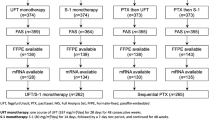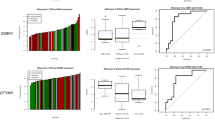Abstract
Previous research has identified differences in mutation frequency in genes implicated in chemotherapy resistance between mucinous and non-mucinous colorectal cancers (CRC). We hypothesized that outcomes in mucinous and non-mucinous CRC may be influenced by expression of genes responsible for chemotherapy resistance. Gene expression data from primary tumor samples were extracted from The Cancer Genome Atlas PanCancer Atlas. The distribution of clinical, pathological, and gene expression variables was compared between 74 mucinous and 521 non-mucinous CRCs. Predictors of overall survival (OS) were assessed in a multivariate analysis. Kaplan–Meier curves were constructed to compare survival according to gene expression using the log rank test. The median expression of 5-FU-related genes TYMS, TYMP, and DYPD was significantly higher in mucinous CRC compared to non-mucinous CRC (p < 0.001, p = 0.003, p < 0.001, respectively). The median expression of oxaliplatin-related genes ATP7B and SRPK1 was significantly reduced in mucinous versus non-mucinous CRC (p = 0.004, p = 0.007, respectively). At multivariate analysis, age (odds ratio (OR) = 0.96, p < 0.001), node positive disease (OR = 0.49, p = 0.005), and metastatic disease (OR = 0.32, p < 0.001) remained significant negative predictors of OS, while high SRPK1 remained a significant positive predictor of OS (OR = 1.59, p = 0.037). Subgroup analysis of rectal cancers demonstrated high SRPK1 expression was associated with significantly longer OS compared to low SRPK1 expression (p = 0.011). This study highlights that the molecular differences in mucinous CRC and non-mucinous CRC extend to chemotherapy resistance gene expression. SRPK1 gene expression was associated with OS, with a prognostic role identified in rectal cancers.
This is a preview of subscription content, access via your institution
Access options
Subscribe to this journal
Receive 6 print issues and online access
$259.00 per year
only $43.17 per issue
Buy this article
- Purchase on Springer Link
- Instant access to full article PDF
Prices may be subject to local taxes which are calculated during checkout


Similar content being viewed by others
References
Longley DB, Allen WL, Johnston PG. Drug resistance, predictive markers and pharmacogenomics in colorectal cancer. Biochim Biophys Acta. 2006;1766:184–96.
Salonga D, Danenberg KD, Johnson M, Metzger R, Groshen S, Tsao-Wei DD, et al. Colorectal tumors responding to 5-fluorouracil have low gene expression levels of dihydropyrimidine dehydrogenase, thymidylate synthase, and thymidine phosphorylase. Clin Cancer Res. 2000;6:1322–7.
Borst P, Evers R, Kool M, Wijnholds J. A family of drug transporters: the multidrug resistance-associated proteins. J Natl Cancer Inst. 2000;92:1295–302.
Kang H, O’Connell JB, Maggard MA, Sack J, Ko CY. A 10-year outcomes evaluation of mucinous and signet-ring cell carcinoma of the colon and rectum. Dis Colon Rectum. 2005;48:1161–8.
Symonds DA, Vickery AL. Mucinous carcinoma of the colon and rectum. Cancer. 1976;37:1891–900.
Park JS, Huh JW, Park YA, Cho YB, Yun SH, Kim HC, et al. Prognostic comparison between mucinous and nonmucinous adenocarcinoma in colorectal cancer. Medicine. 2015;94:e658.
Catalano V, Loupakis F, Graziano F, Bisonni R, Torresi U, Vincenzi B, et al. Prognosis of mucinous histology for patients with radically resected stage II and III colon cancer. Ann Oncol. 2012;23:135–41.
McCawley N, Clancy C, O’Neill BD, Deasy J, McNamara DA, Burke JP. Mucinous rectal adenocarcinoma is associated with a poor response to neoadjuvant chemoradiotherapy: a systematic review and meta-analysis. Dis Colon Rectum. 2016;59:1200–8.
Reynolds IS, O’Connell E, Fichtner M, McNamara DA, Kay EW, Prehn JHM, et al. Mucinous adenocarcinoma is a pharmacogenomically distinct subtype of colorectal cancer. Pharmacogenomics J. 2019;20:524-532.
Longley DB, Harkin DP, Johnston PG. 5-fluorouracil: mechanisms of action and clinical strategies. Nat Rev Cancer. 2003;3:330–8.
National Cancer Institute Genomic Data Commons Portal. Legacy Archive. Available from: https://portal.gdc.cancer.gov/legacy-archive/search/f. Accessed 14 Apr 2020.
Liu J, Lichtenberg T, Hoadley KA, Poisson LM, Lazar AJ, Cherniack AD, et al. An integrated TCGA pan-cancer clinical data resource to drive high-quality survival outcome analytics. Cell. 2018;173:400–16.e11.
National Cancer Institute Genomic Data Commons Pan-Cancer Atlas. Supplemental Data RNA—EBPlusPlusAdjustPANCAN_IlluminaHiSeq_RNASeqV2.geneExp.tsv. Available from: https://gdc.cancer.gov/about-data/publications/pancanatlas. Accessed 14 Apr 2020.
Reynolds IS, Furney SJ, Kay EW, McNamara DA, Prehn JHM, Burke JP. Meta-analysis of the molecular associations of mucinous colorectal cancer. Br J Surg. 2019;106:682–91.
Hugen N, Simons M, Halilović A, van der Post RS, Bogers AJ, Marijnissen-van Zanten MA, et al. The molecular background of mucinous carcinoma beyond MUC2. J Pathol Clin Res. 2015;1:3–17.
Hyngstrom JR, Hu CY, Xing Y, You YN, Feig BW, Skibber JM, et al. Clinicopathology and outcomes for mucinous and signet ring colorectal adenocarcinoma: analysis from the National Cancer Data Base. Ann Surg Oncol. 2012;19:2814–21.
Verhulst J, Ferdinande L, Demetter P, Ceelen W. Mucinous subtype as prognostic factor in colorectal cancer: a systematic review and meta-analysis. J Clin Pathol. 2012;65:381–8.
Copur S, Aiba K, Drake JC, Allegra CJ, Chu E. Thymidylate synthase gene amplification in human colon cancer cell lines resistant to 5-fluorouracil. Biochem Pharm. 1995;49:1419–26.
Artinyan A, Essani R, Lake J, Kaiser AM, Vukasin P, Danenberg P, et al. Molecular predictors of lymph node metastasis in colon cancer: increased risk with decreased thymidylate synthase expression. J Gastrointest Surg. 2005;9:1216–21.
Lu Y, Zhuo C, Cui B, Liu Z, Zhou P, Lu Y, et al. TYMS serves as a prognostic indicator to predict the lymph node metastasis in Chinese patients with colorectal cancer. Clin Biochem. 2013;46:1478–83.
Sanguedolce R, Vultaggio G, Sanguedolce F, Modica G, Li Volsi F, Diana G, et al. The role of thymidylate synthase levels in the prognosis and the treatment of patients with colorectal cancer. Anticancer Res. 1998;18:1515–20.
Qiu LX, Tang QY, Bai JL, Qian XP, Li RT, Liu BR, et al. Predictive value of thymidylate synthase expression in advanced colorectal cancer patients receiving fluoropyrimidine-based chemotherapy: evidence from 24 studies. Int J Cancer. 2008;123:2384–9.
Popat S, Matakidou A, Houlston RS. Thymidylate synthase expression and prognosis in colorectal cancer: a systematic review and meta-analysis. J Clin Oncol. 2004;22:529–36.
Aschele C, Debernardis D, Tunesi G, Maley F, Sobrero A. Thymidylate synthase protein expression in primary colorectal cancer compared with the corresponding distant metastases and relationship with the clinical response to 5-fluorouracil. Clin Cancer Res. 2000;6:4797–802.
Marsh S, McKay JA, Curran S, Murray GI, Cassidy J, McLeod HL. Primary colorectal tumour is not an accurate predictor of thymidylate synthase in lymph node metastasis. Oncol Rep. 2002;9:231–4.
Koumarianou A, Tzeveleki I, Mekras D, Eleftheraki AG, Bobos M, Wirtz R, et al. Prognostic markers in early-stage colorectal cancer: significance of TYMS mRNA expression. Anticancer Res. 2014;34:4949–62.
Lassmann S, Hennig M, Rosenberg R, Nährig J, Schreglmann J, Krause F, et al. Thymidine phosphorylase, dihydropyrimidine dehydrogenase and thymidylate synthase mRNA expression in primary colorectal tumors-correlation to tumor histopathology and clinical follow-up. Int J Colorectal Dis. 2006;21:238–47.
Mimori K, Matsuyama A, Yoshinaga K, Yamashita K, Masuda T, Inoue H, et al. Localization of thymidine phosphorylase expression in colorectal carcinoma tissues by in situ RT-PCR assay. Oncology. 2002;62:327–32.
Tokunaga Y, Hosogi H, Hoppou T, Nakagami M, Tokuka A, Ohsumi K. Prognostic value of thymidine phosphorylase/platelet-derived endothelial cell growth factor in advanced colorectal cancer after surgery: evaluation with a new monoclonal antibody. Surgery. 2002;131:541–7.
Samimi G, Katano K, Holzer AK, Safaei R, Howell SB. Modulation of the cellular pharmacology of cisplatin and its analogs by the copper exporters ATP7A and ATP7B. Mol Pharm. 2004;66:25–32.
Martinez-Balibrea E, Martínez-Cardús A, Musulén E, Ginés A, Manzano JL, Aranda E, et al. Increased levels of copper efflux transporter ATP7B are associated with poor outcome in colorectal cancer patients receiving oxaliplatin-based chemotherapy. Int J Cancer. 2009;124:2905–10.
Gottesman MM, Fojo T, Bates SE. Multidrug resistance in cancer: role of ATP-dependent transporters. Nat Rev Cancer. 2002;2:48–58.
Candeil L, Gourdier I, Peyron D, Vezzio N, Copois V, Bibeau F, et al. ABCG2 overexpression in colon cancer cells resistant to SN38 and in irinotecan-treated metastases. Int J Cancer. 2004;109:848–54.
Liu HG, Pan YF, You J, Wang OC, Huang KT, Zhang XH. Expression of ABCG2 and its significance in colorectal cancer. Asian Pac J Cancer Prev. 2010;11:845–8.
Wang X, Xia B, Liang Y, Peng L, Wang Z, Zhuo J, et al. Membranous ABCG2 expression in colorectal cancer independently correlates with shortened patient survival. Cancer Biomark. 2013;13:81–8.
Debunne H, Ceelen W. Mucinous differentiation in colorectal cancer: molecular, histological and clinical aspects. Acta Chir Belg. 2013;113:385–90.
Yeakley JM, Tronchère H, Olesen J, Dyck JA, Wang HY, Fu XD. Phosphorylation regulates in vivo interaction and molecular targeting of serine/arginine-rich pre-mRNA splicing factors. J Cell Biol. 1999;145:447–55.
Schenk PW, Boersma AW, Brandsma JA, den Dulk H, Burger H, Stoter G, et al. SKY1 is involved in cisplatin-induced cell kill in Saccharomyces cerevisiae, and inactivation of its human homologue, SRPK1, induces cisplatin resistance in a human ovarian carcinoma cell line. Cancer Res. 2001;61:6982–6.
Thorsen K, Mansilla F, Schepeler T, Oster B, Rasmussen MH, Dyrskjot L, et al. Alternative splicing of SLC39A14 in colorectal cancer is regulated by the Wnt pathway. Mol Cell Proteom. 2011;10:M110.002998.
Plasencia C, Martinez-Balibrea E, Martinez-Cardus A, Quinn DI, Abad A, Neamati N. Expression analysis of genes involved in oxaliplatin response and development of oxaliplatin-resistant HT29 colon cancer cells. Int J Oncol. 2006;29:225–35.
Hayes GM, Carrigan PE, Miller LJ. Serine-arginine protein kinase 1 overexpression is associated with tumorigenic imbalance in mitogen-activated protein kinase pathways in breast, colonic, and pancreatic carcinomas. Cancer Res. 2007;67:2072–80.
Yi N, Xiao M, Jiang F, Liu Z, Ni W, Lu C, et al. SRPK1 is a poor prognostic indicator and a novel potential therapeutic target for human colorectal cancer. Onco Targets Ther. 2018;11:5359–70.
Glynne-Jones R, Wyrwicz L, Tiret E, Brown G, Rödel C, Cervantes A, et al. Rectal cancer: ESMO Clinical Practice Guidelines for diagnosis, treatment and follow-up. Ann Oncol. 2018;29:iv263.
Funding
Funding for this project was provided by the Bons Secours Hospital Dublin through the RCSI StAR MD scholarship and by the Beaumont Hospital Colorectal Research Trust.
Author information
Authors and Affiliations
Corresponding author
Ethics declarations
Conflict of interest
The authors declare no competing interests.
Additional information
Publisher’s note Springer Nature remains neutral with regard to jurisdictional claims in published maps and institutional affiliations.
Rights and permissions
About this article
Cite this article
O’Connell, E., Reynolds, I.S., Salvucci, M. et al. Mucinous and non-mucinous colorectal cancers show differential expression of chemotherapy metabolism and resistance genes. Pharmacogenomics J 21, 510–519 (2021). https://doi.org/10.1038/s41397-021-00229-5
Received:
Revised:
Accepted:
Published:
Issue Date:
DOI: https://doi.org/10.1038/s41397-021-00229-5
This article is cited by
-
Interaction analysis of high-risk pathological features on adjuvant chemotherapy survival benefit in stage II colon cancer patients: a multi-center, retrospective study
BMC Cancer (2023)
-
Adjuvant Radiotherapy Is Not Necessary for Stage III Mucinous Rectal Cancer: Evidence Based on Long Survival Analysis from SEER Data
Journal of Gastrointestinal Surgery (2023)
-
Serine-Arginine Protein Kinase 1 (SRPK1): a systematic review of its multimodal role in oncogenesis
Molecular and Cellular Biochemistry (2022)



